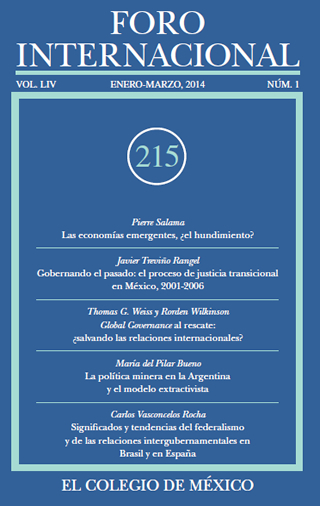Make a Submission
Upcoming Articles
bloque
Information
 |
 |
Foro Internacional es una publicación trimestral editada por El Colegio de México, Carretera Picacho Ajusco 20, Ampliación Fuentes del Pedregal, Tlalpan, C.P. 14110, Ciudad de México, México, Tel. (55) 5449-3000, https://forointernacional.colmex.mx, revfi@colmex.mx. Director: Mariano Sánchez Talanquer. Editora: Diana Goldberg. Reserva de Derechos al Uso Exclusivo No. 04-2016-031810410500-203, ISSN (impreso): 0185-013X, ISSN (electrónico): 2448-6523, otorgados por el Instituto Nacional del Derecho de Autor. Composición tipográfica: El Atril Tipográfico, S.A. de C.V. Responsable de la última actualización de este número: Virginia López Cisneros; fecha de última modificación: 04 de noviembre del 2025.
La responsabilidad por los artículos y las reseñas bibliográficas es estrictamente la personal de sus autores. A ésta, en consecuencia, son ajenos la revista, El Colegio de México y las instituciones a las que están asociados los autores.
Se autoriza cualquier reproducción parcial o total de los contenidos o imágenes de la publicación, incluido el almacenamiento electrónico, siempre y cuando sea sin fines de lucro o para usos estrictamente académicos, citando invariablemente la fuente sin alteración del contenido y dando los créditos autorales.
 La revista está bajo una licencia de Creative Commons Atribución-NoComercial-SinDerivadas 4.0 Internacional (CC BY-NC-ND 4.0).
La revista está bajo una licencia de Creative Commons Atribución-NoComercial-SinDerivadas 4.0 Internacional (CC BY-NC-ND 4.0).










